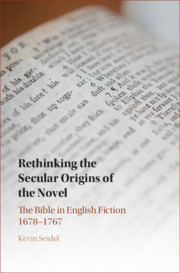Book contents
- Rethinking the Secular Origins of the Novel
- Rethinking the Secular Origins of the Novel
- Copyright page
- Contents
- Figures
- Tables
- Appendixes
- Acknowledgments
- Introduction
- Part I Rethinking the Secular at the Origins of the English Novel
- 1 A Secular for Literary Studies
- Chapter 2 The Bible, the Novel, and the Veneration of Culture
- Part II Versions of Biblical Authority
- Part III Uses of Scripture for Fiction
- Appendices
- Notes
- Works Cited
- Index
Chapter 2 - The Bible, the Novel, and the Veneration of Culture
from Part I - Rethinking the Secular at the Origins of the English Novel
Published online by Cambridge University Press: 16 March 2021
- Rethinking the Secular Origins of the Novel
- Rethinking the Secular Origins of the Novel
- Copyright page
- Contents
- Figures
- Tables
- Appendixes
- Acknowledgments
- Introduction
- Part I Rethinking the Secular at the Origins of the English Novel
- 1 A Secular for Literary Studies
- Chapter 2 The Bible, the Novel, and the Veneration of Culture
- Part II Versions of Biblical Authority
- Part III Uses of Scripture for Fiction
- Appendices
- Notes
- Works Cited
- Index
Summary
Chapter 2 connects histories of the English Bible to histories of the English novel. When culture is understood to be a kind of secular scripture, the intellectual problems involved in telling the origins of the English novel – that is, the change that occurs in English prose fiction during the eighteenth century – do not get resolved so much as displaced by other problems, such as the rise of the middle class (Ian Watt) or the twin crises of truth and virtue (Michael McKeon) or the advent of the print-media entertainment industry (William Warner). This chapter discusses a recent exhibit at the Folger Shakespeare Library commemorating the 400th anniversary of the King James Bible, two passages from Olaudah Equiano’s Interesting Narrative (1789), and Bruno Latour’s actor–network theory to suggest how we might approach culture differently in literary studies and how we might thereby reassemble the secular at the origins of the English novel in a way that opens up new questions about novelistic realism. The chapter ends with a brief discussion of why it matters to think through the postsecular and the postcritical together.
- Type
- Chapter
- Information
- Rethinking the Secular Origins of the NovelThe Bible in English Fiction 1678–1767, pp. 37 - 64Publisher: Cambridge University PressPrint publication year: 2021



